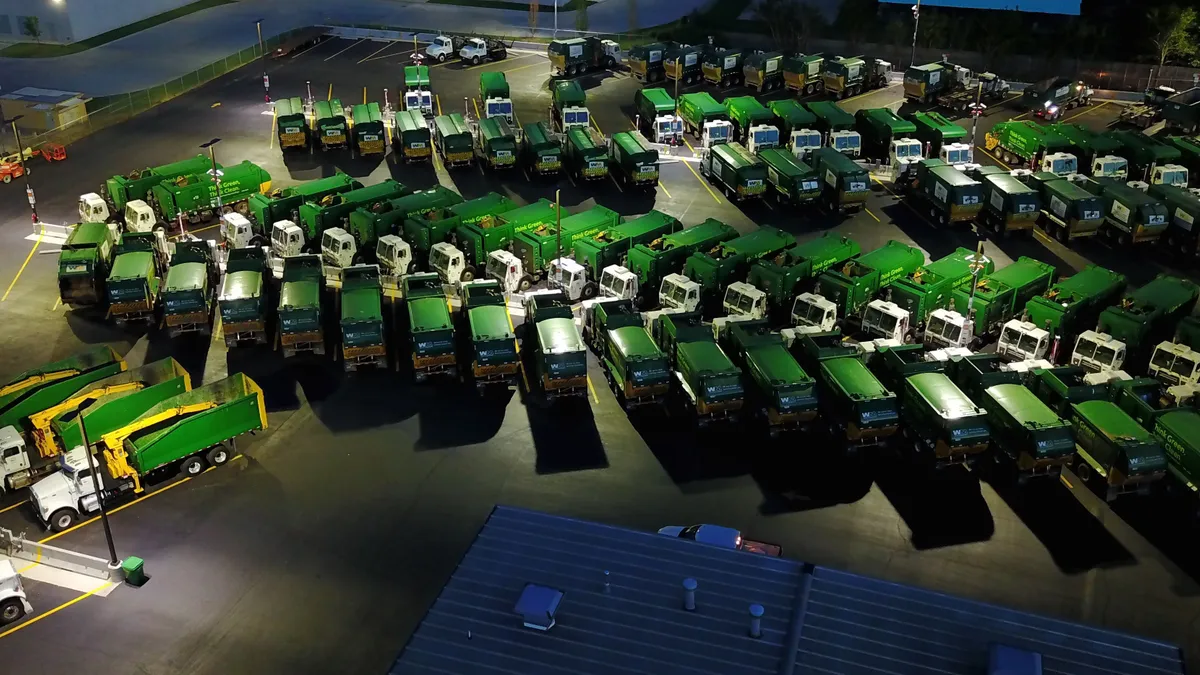Q2 Earnings
| Revenue | $3.95B |
| YoY Change | 5.6%▲ |
| Net Income | $381M |
Waste Management's Q2 earnings results followed a similar pattern from past quarters, in which gains across all other aspects of the business were more than enough to cover ongoing recycling challenges.
Adjusted operating EBITDA grew by 6.9% year-over-year (YoY) to hit $1.13 billion, which CEO Jim Fish described as "pretty darn impressive" during the company's earnings call. Operating EBITDA for collection and disposal was even better — up by 9.3%.
The landfill economy
- Collection and disposal volumes grew by 4.4%, driven in part by strong construction and demolition (C&D) activity (including California wildfire debris) and continued special waste strength. Pricing yield on municipal solid waste (MSW) hit 3.6%, which Fish described as the highest "in a decade."
- With expenses such as transportation and leachate management on the rise, Waste Management aims to keep raising prices at both landfills and transfer stations. Fish said the goal is to expand margins beyond just covering costs or inflation, calling the current moment "a breath of fresh air after what feels like a decade of 1% yield at the landfill."
- Financial analysts probing for any early evidence of an economic downturn were once again rebuffed. While Fish described the current economy as a "real enigma," he pointed to ongoing growth in commercial volumes from small businesses, special waste from industrial players and C&D from major projects as signs that little has changed.
The strength of Waste Management's collection and disposal business — and the industry's in general — has now continued so long it may bear new adjectives. As CFO Devina Rankin remarked at this year's WasteExpo: “We often say garbage is good, but I don’t think that’s a strong enough statement these days. Garbage really is great."
While executives recognize the increasing regulatory and technical challenges of running landfills, the numbers continue to show the effort is still very worthwhile from a financial standpoint.
As volumes go up, and capacity tightens in certain regions, demand will remain high. Waste Management estimates it will now be on the top end of capital expenditure guidance for the year (around $1.65-1.75 billion) due in part to more landfill activity than anticipated.
It's possible this calculus could change if the economy declines, but even then there will still be plenty of material in need of burial. The regular occurrence of natural disasters was raised multiple times.
Fish was also optimistic about the possibility to take in more coal ash over the next decade — estimating there could be upward of 700 millions tons currently sitting in utility ponds.
Recycling off the cliff
- Waste Management Q2 recycling revenue came in at $264 million, down $38 million YoY from what was already a lower number at the time. Driven by a 33% drop in commodity prices, this latest situation has led executives to confirm recycling will be a headwind for 2019.
- On a more positive note, the company highlighted a $6 million improvement in operating EBITDA for recycling as a sign that higher fees and pricing have worked. COO John Morris estimated the company had renegotiated 35-40% of its contracts so far, describing it as "middle innings" on the commercial side and "maybe the third inning" on residential.
- Fish said the extended commodity slump has also made it easier to prove "this business has really fallen off a cliff" when talking with customers. "So if there is a silver lining to a dark cloud, it's that when we go in for a negotiation on these big contracts, we do have a pretty compelling story."
Recycling revenues now account for an increasingly small share of the company's business, with no quick turnaround in sight.
Decreased demand for recycled feedstock from both Amazon's switch to different packaging, as well as the continued closure of retail stores, were cited as the latest negative factors by both Fish and the company's 10-Q.
Executives once again talked up construction of a "recycling plant of the future" in Chicago as one example of their commitment to making this part of the business work. Morris told Waste Dive in May he hopes to see a 40% cut in labor costs at the facility once it's fully operational next year. He was similarly bullish during the earnings call.
"While the impact of one plant on the income statement in 2020 is not going to be material, if it proves out the way we think it will from a process and from an equipment standpoint, this then would start this kind of cascading effect where we replace every one of our single streams potentially with a plant that looks like that," said Morris.
Looking ahead
- The federal regulatory process is ongoing for Waste Management's planned purchase of Advanced Disposal Services, with the expectation of more to report in 60-90 days. Fish was even optimistic the deal could close earlier than expected.
- Waste Management reported $48 million in unspecified acquisitions during Q2, for a total $440 million through June. Rankin estimated these deals were worth about $120 million in acquired revenue and said more could be coming "at the right price."
- The company paid $217 million in dividends and repurchased $180 million worth of shares during Q2. Waste Management still has board authorization for another $1.3 billion in repurchases, but doesn't anticipate any further activity this year.















